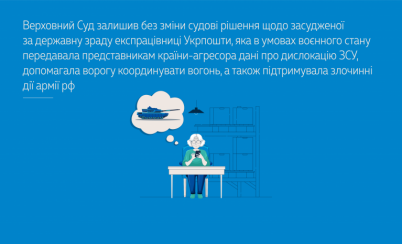Contact center of the Ukrainian Judiciary 044 207-35-46

On 24 February 2022, the President of Ukraine declared martial law in Ukraine, which is still in force, and therefore any act constituting a form of treason (defection to the enemy during an armed conflict; espionage; assistance to a foreign state, foreign organisation or its representatives in conducting subversive activities against Ukraine) is incriminated with the qualifying feature of being committed under martial law (part 2 of Article 111 of the Criminal Code of Ukraine).
This is stated in the resolution of the Criminal Cassation Court of the Supreme Court, which considered the cassation appeal of the defence lawyer of a former employee of Ukrposhta JSC convicted of high treason (part 2 of Article 111 of the Criminal Code of Ukraine).
In this case, according to the verdict of the local court, which was upheld by the court of appeal, the person was found guilty and sentenced for committing an offence under part 2 of Article 111 of the Criminal Code of Ukraine. As the courts found, the person used the Telegram messenger to transmit to representatives of the aggressor country information on the location of military equipment and personnel of the Armed Forces of Ukraine, as well as their movements in Kharkiv . She also reported the locations of settlements in the Kharkiv region and the distance between them, indicated the locations of hits of artillery and aircraft munitions fired by the russian armed forces, which allowed the military of the aggressor country to coordinate their fire, provided information on humanitarian aid distribution points for the residents of Kharkiv and in every way showed preferences and supported the criminal actions of the russian army.
In the cassation appeal, the defence lawyer pointed out, in particular, the absence of a criminal offence under part 2 of Article 111 of the Criminal Code of Ukraine. According to the panel of judges of the SC Criminal Cassation Court, these arguments are unfounded.
As stated by the SC Criminal Cassation Court, the commission of any act under part 1 of Article 111 of the Criminal Code of Ukraine causes damage to the national security of Ukraine and is considered subversive activity against it. Assisting a foreign state, foreign organisation or its representatives in carrying out subversive activities against Ukraine means facilitating their possible or actual efforts to harm the national security of Ukraine. The types of subversive activities against Ukraine can be diverse.
Moreover, it should be borne in mind that high treason is a completed crime not from the moment of establishing contact with a foreign state, foreign organisation or its representatives or from the moment of receiving a criminal task from them, but from the moment of committing certain specific acts to the detriment of Ukraine.
When committing high treason, the perpetrator is aware that he/she is siding with the enemy in a state of war or during an armed conflict (committing espionage, assisting a foreign state, foreign organisation or its representatives in carrying out subversive activities against Ukraine) and wishes to do so.
The phrase "to the detriment of the sovereignty, territorial integrity and inviolability, defence capability, state, economic or information security of Ukraine" defines the subjective orientation of the perpetrator's actions, but does not describe the socially dangerous consequences of the act. The fact of causing this damage is not relevant for the qualification of the act under Article 111 of the Criminal Code of Ukraine.
At the same time, the panel of judges noted that in connection with the provisions of Article 111 of the Criminal Code of Ukraine, subversive activities are actions of foreign states, foreign organisations or their representatives aimed at undermining the foundations of national security of Ukraine and causing significant damage to the sovereignty, territorial integrity, inviolability, defence capability, state, economic or information security of Ukraine.
Taking into account the factual circumstances of the criminal proceedings established by the courts of first and appellate instances, the court panel concluded that the person acted with the intent to harm the sovereignty, territorial integrity and inviolability, defence capability, state, economic and information security of Ukraine under martial law, and that her actions consisted in assisting a foreign state, foreign organisation or its representatives in conducting subversive activities against Ukraine. Therefore, her actions constitute a criminal offence under part 2 of Article 111 of the Criminal Code of Ukraine.
The Resolution of the Criminal Cassation Court of the Supreme Court of 9 April 2024 in case No. 639/1528/22 (proceedings No. 51-6937км23) - https://reyestr.court.gov.ua/Review/118297134.
This and other legal positions of the Supreme Court can be found in the Database of Legal Positions of the Supreme Court - https://lpd.court.gov.ua.